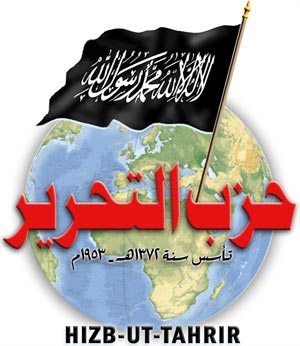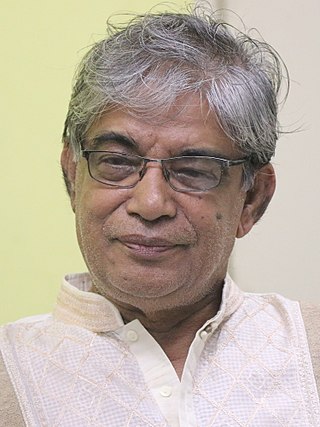Related Research Articles

Hizb ut-Tahrir is an international pan-Islamist and Islamic fundamentalist political organization whose stated aim is the re-establishment of the Islamic caliphate to unite the Muslim community and implement sharia globally.
Jagrata Muslim Janata Bangladesh, is an Islamist extremist group operating in and around northwestern Bangladesh. The Government of Bangladesh has banned the JMJB, classifying it as a terrorist organization. It is described by Bangladeshi police as an offshoot of the related Jamaat-ul-Mujahideen Bangladesh outfit.
Terrorism in Tajikistan stems largely from the forces of the political opposition who opposed the comprehensive peace agreement that ended the civil war in 1997. President Emomali Rahmonov and UTO leader Said Abdullah Nuri signed the agreement on 27 June, believing it would bring an end to hostilities. However, dissident Islamist militants led by Tohir Yo‘ldosh and Juma Namangani formed the Islamic Movement of Uzbekistan in 1998, allying with Al-Qaeda and vowing to unite Central Asia as an Islamic state. The latest terror attacks took place in the Qabodiyon District on November 6, 2019, when a policeman and a border guard were killed by several Islamic State militants. 15 terrorists were also killed.
Terrorism in Kyrgyzstan has increased since the U.S. military invaded Afghanistan and overthrew the Taliban in 2001. The governments of Kyrgyzstan and Uzbekistan provided airbases for counter-terrorism operations. Southern Kyrgyzstan is increasingly sympathetic to terrorism and Islamic extremism.
The threat of terrorism in Kazakhstan plays an increasingly important role in relations with the United States which in 2006 were at an all-time high. Kazakhstan has taken Uzbekistan's place as the favored partner in Central Asia for both Russia and the United States. Kazakhstan's counter-terrorism efforts resulted in the country's 94th ranking among 130 countries in the 2016 Global Terrorism Index published by the Institute of Economics and Peace. The higher the position on the ranking is, the bigger the impact of terrorism in the country. Kazakhstan's 94th place puts it in a group of countries with the lowest impact of terrorism.

The Bangladesh Telecommunication Regulatory Commission (BTRC) is an independent commission founded under the Bangladesh Telecommunication Act, 2001. The BTRC is responsible for regulating all matters related to telecommunications of Bangladesh. The chairman of the commission has the status of a judge of the Bangladesh High Court. Md Mohiuddin Ahmed is the chairman of the commission.
Ahmed Rajib Haider was a Bangladeshi atheist blogger. He used to blog in the blogging communities namely somewhereinblog.net, amarblog.com and nagorikblog.com and used the pseudonym Thaba Baba.

The Ansarullah Bangla Team (ABT) (Bengali: আনসারুল্লাহ বাংলা টিম), also known as Ansar-al Islam Bangladesh/Ansar Bangla is an Islamic organization in Bangladesh, implicated in crimes including some brutal attacks and murders of atheist bloggers from 2013 to 2015 and a bank heist in April 2015. The gang was outlawed days after the bank robbery by the Ministry of Home Affairs on 25 May 2015. The group has been claimed by police to be linked to Islami Chhatra Shibir, the student wing of Jamaat-e-Islami party in Bangladesh.

Mustafa Jabbar is a Bangladeshi businessman, technology entrepreneur and a former Minister of Post and Telecommunication in the Government of Bangladesh. He also served as the president of Bangladesh Association of Software and Information Services (BASIS). He was initially known for the creation of Bijoy Bengali keyboard, which was developed in 1988, and was a widely used Bengali input method before the release of Unicode based Avro Keyboard. He served as the president of Bangladesh Computer Samity, the national ICT organisation of Bangladesh for four consecutive periods. He is a champion of Bangla Bhasha Procholon Ain, 1987, and has been praised for promoting the Bengali language in the digital media.
Irreligion in Bangladesh is rare and uncommon publicly. A Gallup survey conducted between 2014 – 2015 found that approximately 5% of Bangladeshis were non religious and less than 1% identified as convinced atheists. Bangladesh has 157.8 million people as of 2015 estimation.
Avijit Roy was a Bangladeshi-American engineer, online activist, writer, and blogger known for creating and administrating the Mukto-Mona, an Internet blogging community for Bangladeshi freethinkers, rationalists, skeptics, atheists, and humanists. Roy was an advocate of free expression in Bangladesh and coordinated international protests against government censorship and imprisonment of atheist bloggers. He was killed by machete-wielding assailants in Dhaka, Bangladesh, on 26 February 2015; the Islamic militant organization Ansarullah Bangla Team claimed responsibility for the attack.

Asif Mohiuddin is a Bangladeshi atheist and secular activist, religious critic and feminist. In 2012, he won The Bobs-Best of Online Activism award from Deutsche Welle, who stated that "Asif's blog was one of the most read web pages in Bangladesh and is known for its strong criticism of Islamic fundamentalism in Bangladesh's "anti-people politics", his blog was later blocked and banned in Bangladesh by its government. On 15 January 2013, he survived an assassination attempt by Islamic extremists. A few months later, he was imprisoned twice by the Bangladesh Government for posting "offensive comments about Islam and Mohammad". Due to sustained international pressure, Mohiuddin was released, after which he fled from his country to Germany in 2014. In 2015, he received the Anna Politkovskaya Prize for Journalism, awarded by Italian magazine Internazionale.

Hizb ut-Tahrir is an international pan-Islamist and fundamentalist political organisation. The organisation is considered a "radical Islamic group" and has come under scrutiny from the Australian government.
Attacks by fundamentalists in Bangladesh refers to a period of turbulence in Bangladesh between 2013 and 2016 where attacks on a number of secularist and atheist writers, bloggers, and publishers in Bangladesh; foreigners; homosexuals; and religious minorities such as Hindus, Buddhists, Christians and Ahmadis were seen as having attacked Islam and Muhammad with many killed by Muslim extremists in retaliation. By 2 July 2016 a total of 48 people, including 20 foreign nationals, were killed in such attacks. These attacks were largely blamed on extremist groups such as Ansarullah Bangla Team and Islamic State of Iraq and Syria. The Bangladeshi government was criticized for its response to the attacks, which included charging and jailing some of the secularist bloggers for allegedly defaming some religious groups; or hurting the religious sentiments of different religious groups; or urging the bloggers to flee overseas. This strategy was seen by some as pandering to hard line elements within Bangladesh's Muslim majority population. About 89% of the population in Bangladesh is Sunni Muslim. The government's eventual crackdown in June 2016 was also criticized for its heavy-handedness, as more than 11,000 people were arrested in a little more than a week.

Hizb ut-Tahrir Britain is the official name of the United Kingdom branch of Hizb ut-Tahrir, a transnational, pan-Islamist and fundamentalist group that seeks to re-establish "the Islamic Khilafah (Caliphate)" as an Islamic "superstate" where Muslim-majority countries are unified and ruled under Islamic Shariah law, and which eventually expands globally to include non-Muslim states such as Britain. The group was designated a proscribed terrorist organization in the UK in January 2024.

Hizb ut-Tahrir is a pan-Islamist and fundamentalist group seeking to re-establish "the Islamic Khilafah (Caliphate)" as an Islamic "superstate" where Muslim-majority countries are unified and ruled under Islamic Shariah law, and which eventually expands globally to include non-Muslim states. In Central Asia, the party has expanded since the breakup of the Soviet Union in the early 1990s from a small group to "one of the most powerful organizations" operating in Central Asia. The region itself has been called "the primary battleground" for the party. Uzbekistan is "the hub" of Hizb ut-Tahrir's activities in Central Asia, while its "headquarters" is now reportedly in Kyrgyzstan.
Syed Mohammad Ziaul Haque is a Bangladesh Army officer and a fugitive. He was one of the main plotters of the 2011 Bangladesh coup d'état attempt. He is a top military commander of the Al-Qaeda linked Ansarullah Bangla Team, which has carried out terror attacks in Bangladesh.
Islami Bank Medical College is a private Medical College located in Rajshahi, Bangladesh.
2005 October Bangladesh court bombing was a synchronized bombing on 3 October 2005 that targeted courts in Chandpur and Lakshmipur and resulted in 2 deaths and 34 injuries. It was carried out by Jamaat-ul-Mujahideen Bangladesh, an Islamist terrorist organisation, that opposed the secular judiciary and legal system in Bangladesh.
References
- ↑ "Hizb-ut-Tahrir man held in Jessore". Prothom Alo. Retrieved 3 March 2017.
- ↑ "24 'Islami Samaj members' sent to jail". Dhaka Tribune. 6 February 2017. Retrieved 3 March 2017.
- ↑ "Hizb ut-Tahrir Bangladesh coordinator Mohiuddin, five others indicted". bdnews24.com. Retrieved 3 March 2017.
- ↑ "Farabi charged in Ananta Bijoy murder case". Dhaka Tribune. 5 February 2017. Retrieved 3 March 2017.
- ↑ "Banned Hizb ut-Tahrir now prefers direct action". archive.dhakatribune.com. Retrieved 3 March 2017.
- ↑ "Hizb ut-Tahrir banned". The Daily Star. 22 October 2009. Retrieved 3 March 2017.
- ↑ "Bangladesh Islamist group banned". news.bbc.co.uk. 23 October 2009. Retrieved 3 March 2017.
- ↑ "Who is militant Zia?". Dhaka Tribune. 3 August 2016. Retrieved 3 March 2017.
- ↑ "Hizb-ut Tahrir coordinator, 5 others indicted". Dhaka Tribune. 27 September 2016. Retrieved 3 March 2017.
- ↑ "Hizb-ut Tahrir, police clash at Mohammadpur". bdnews24.com. Retrieved 3 March 2017.
- 1 2 "Did Hizb ut-Tahrir enjoy impunity?". archive.dhakatribune.com. Retrieved 3 March 2017.
- ↑ "Hizb ut-Tahrir funding families of attackers". archive.dhakatribune.com. Retrieved 3 March 2017.
- ↑ "Dhaka University expels seven members of Hizb ut-Tahrir". bdnews24.com. Retrieved 3 March 2017.
- ↑ "Hizb-ut-Tahrir making a comeback". archive.dhakatribune.com. Retrieved 3 March 2017.
- ↑ "Wider support for Rohingya terrorists hints at further attacks". Dhaka Tribune. 17 February 2017. Retrieved 3 March 2017.
- ↑ "The infrastructure of terror in Bangladesh". www.dailypioneer.com. Retrieved 3 March 2017.
- ↑ "Spotlight on private universities after ISIS attack". universityworldnews.com. Retrieved 3 March 2017.
- ↑ "Modern Dhaka varsity battles terror shadow". The Telegraph. Archived from the original on 25 July 2016. Retrieved 3 March 2017.
- ↑ "NSU acting pro-VC, 2 others arrested 'for sheltering' Gulshan cafe attackers". bdnews24.com. Retrieved 3 March 2017.
- ↑ "Govt alert about goings-on in North South University, says Nahid". bdnews24.com. Retrieved 3 March 2017.
- ↑ "NSU promises to uproot militancy after students' link with deadly Bangladesh terror attacks". bdnews24.com. Retrieved 3 March 2017.